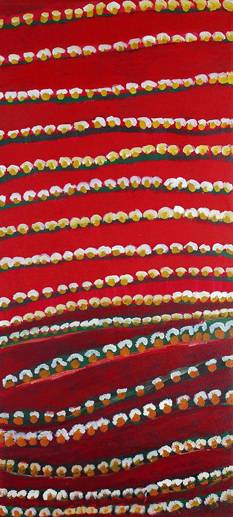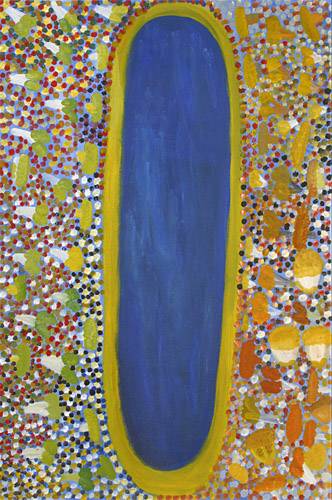WAKARTU CORY SURPRISE (dec)
Palma
283/10
Atelier Acrylic Paint on 14oz Canvas
120 x 120cm | 47.24 x 47.24in
Mangkaja Artists
ENQUIRE
WAKARTU CORY SURPRISE (dec)
Jillji
391/08
Atelier Acrylic Paint on 14oz Canvas
120 x 120cm | 47.24 x 47.24in
Mangkaja Artists
ENQUIRE
WAKARTU CORY SURPRISE (dec)
Tapu Jila Waterhole
498/08
Atelier Acrylic Paint on 14oz Canvas
120 x 120cm | 47.24 x 47.24in
Mangkaja Artists
ENQUIRE
WAKARTU CORY SURPRISE (dec)
Tapu
905/09
Atelier Acrylic Paint on 14oz Canvas
120 x 120cm | 47.24 x 47.24in
Mangkaja Artists
ENQUIRE
WAKARTU CORY SURPRISE (dec)
Mimbi
928/07
Atelier Acrylic Paint on 14oz Canvas
120 x 120cm | 47.24 x 47.24in
Mangkaja Artists
ENQUIRE
WAKARTU CORY SURPRISE (dec)
Pirntirri
929/10
Atelier Acrylic Paint on 14oz Canvas
120 x 120cm | 47.24 x 47.24in
Mangkaja Artists
ENQUIRE
WAKARTU CORY SURPRISE (dec)
Tapu
pc531/04
Atelier Artist Acrylic on 11oz Cotton Duck
120 x 90cm | 47.24 x 35.43in
Mangkaja Artists
ENQUIRE
WAKARTU CORY SURPRISE (dec)
Yinijaparri Jumu
pc259/04 (2004)
Atelier Artist Acrylic on 11oz Cotton Duck
90 x 120cm | 35.43 x 47.24in
Mangkaja Artists
ENQUIRE
WAKARTU CORY SURPRISE (dec)
Pirnti
pc434/04
Atelier Artist Acrylic on 10oz Cotton Duck
152 x 55cm | 59.84 x 21.65in
Mangkaja Artists
ENQUIRE
I was born at Tapu in the Great Sandy desert around 1929. Tapu is my father’s country and Kurtal is my mother’s country. My parents died when I was a baby. I grew up at Wayampajarti and that is my country now. I don’t remember my mummy or daddy. They passed away in the desert. When I was crawling my sister-in-law Trixie took me to Christmas Creek. I was promised to one old man who had two wives. We had no clothes when we went in. We were frightened of the Station Manager so we ran away from that place. Two times we ran away to the desert.
I walked out from the bush as a young woman with my two brothers. We were living at Wayampajarti and around that country there. At Wayampajarti there is a jila [permanent waterhole] where Kalpartu [an ancestral snake] lives. When we lived out in the bush we learnt the law. We learnt where the water is, where our country is and where to ï¬nd food. You have to be careful not to go to the wrong places because you might make the Kalpurtu [spirit snake] angry or them other ones like Kukurr Murungkurr Parlangan. You could make other people angry too. You need permission to go to other people’s country.
I went to the desert with my husband to look for kumanjayi [deceased] Pijaju out there, then we all came back for ceremony. My husband did contract work building fences. I followed him on those contracts. I worked as a camp cook. I cooked food for big mobs of people. I cleaned, cooked and milked goats. We worked at Quanbun Downs, Jubilee Station, Yiyili and Cherrabun Station. Then I lived mainly at one place, GoGo Station (near Fitzroy Crossing) until I was old. I came to Fitzroy Crossing in the 1950s. I have a big mob of kids and some of them have passed away now.
I ï¬rst started painting at Karrayili Adult Education Centre in the early eighties. We told our stories through painting and learned to speak to kartiya [European person]. I also did painting at Bayulu community near Fitzroy Crossing. That’s how I told my story to kartiya. We worked on paper then, not canvas or board.
When I paint, I think about my country, and where I have been travelling across that country. I paint from here (points to head - thinking about country) and here (points to breasts, collarbone and shoulder blades - which is a reference to body painting). I think about my people, the old people and what they told me and jumangkarni [Dreamtime]. When I paint I am thinking about law from a long time ago. I like painting, it’s good. I get pamarr [word for rock, stone money] for it. I can buy my food, tyres and ï¬x my car. I give some money to my family and I keep some for myself.
Nobody taught me how to paint, I put down my own ideas. I saw these places for myself, I went there with the old people. I paint jilji [sand hills], jumu [soak water], jila [permanent waterhole], jiwari [rock hole], pamarr [hills and rock country], I think about mangarri [vegetable food] and kuyu [game] from my country and when I was there.
I was born at Tapu in the Great Sandy desert around 1929. Tapu is my father’s country and Kurtal is my mother’s country. My parents died when I was a baby. I grew up at Wayampajarti and that is my country now. I don’t remember my mummy or daddy. They passed away in the desert. When I was crawling my sister-in-law Trixie took me to Christmas Creek. I was promised to one old man who had two wives. We had no clothes when we went in. We were frightened of the Station Manager so we ran away from that place. Two times we ran away to the desert.
I walked out from the bush as a young woman with my two brothers. We were living at Wayampajarti and around that country there. At Wayampajarti there is a jila [permanent waterhole] where Kalpartu [an ancestral snake] lives. When we lived out in the bush we learnt the law. We learnt where the water is, where our country is and where to ï¬nd food. You have to be careful not to go to the wrong places because you might make the Kalpurtu [spirit snake] angry or them other ones like Kukurr Murungkurr Parlangan. You could make other people angry too. You need permission to go to other people’s country.
I went to the desert with my husband to look for kumanjayi [deceased] Pijaju out there, then we all came back for ceremony. My husband did contract work building fences. I followed him on those contracts. I worked as a camp cook. I cooked food for big mobs of people. I cleaned, cooked and milked goats. We worked at Quanbun Downs, Jubilee Station, Yiyili and Cherrabun Station. Then I lived mainly at one place, GoGo Station (near Fitzroy Crossing) until I was old. I came to Fitzroy Crossing in the 1950s. I have a big mob of kids and some of them have passed away now.
I ï¬rst started painting at Karrayili Adult Education Centre in the early eighties. We told our stories through painting and learned to speak to kartiya [European person]. I also did painting at Bayulu community near Fitzroy Crossing. That’s how I told my story to kartiya. We worked on paper then, not canvas or board.
When I paint, I think about my country, and where I have been travelling across that country. I paint from here (points to head - thinking about country) and here (points to breasts, collarbone and shoulder blades - which is a reference to body painting). I think about my people, the old people and what they told me and jumangkarni [Dreamtime]. When I paint I am thinking about law from a long time ago. I like painting, it’s good. I get pamarr [word for rock, stone money] for it. I can buy my food, tyres and ï¬x my car. I give some money to my family and I keep some for myself.
Nobody taught me how to paint, I put down my own ideas. I saw these places for myself, I went there with the old people. I paint jilji [sand hills], jumu [soak water], jila [permanent waterhole], jiwari [rock hole], pamarr [hills and rock country], I think about mangarri [vegetable food] and kuyu [game] from my country and when I was there.
![Australian Indigenous (Aboriginal and Torres Strait Islander) artwork by WAKARTU CORY SURPRISE of Mangkaja Artists. The title is Palma. [283/10] (Atelier Acrylic Paint on 14oz Canvas)](https://media.redotgallery.com/stockroom/gallery/p/artwork/w/palma-3095-MEDIUM-3.jpg)
![Australian Indigenous (Aboriginal and Torres Strait Islander) artwork by WAKARTU CORY SURPRISE of Mangkaja Artists. The title is Jillji. [391/08] (Atelier Acrylic Paint on 14oz Canvas)](https://media.redotgallery.com/stockroom/gallery/j/artwork/w/jillji-3096-MEDIUM-3.jpg)
![Australian Indigenous (Aboriginal and Torres Strait Islander) artwork by WAKARTU CORY SURPRISE of Mangkaja Artists. The title is Tapu Jila Waterhole. [498/08] (Atelier Acrylic Paint on 14oz Canvas)](https://media.redotgallery.com/stockroom/gallery/t/artwork/w/tapu-jila-waterhole-3099-MEDIUM-3.jpg)
![Australian Indigenous (Aboriginal and Torres Strait Islander) artwork by WAKARTU CORY SURPRISE of Mangkaja Artists. The title is Tapu. [905/09] (Atelier Acrylic Paint on 14oz Canvas)](https://media.redotgallery.com/stockroom/gallery/t/artwork/w/tapu-3103-MEDIUM-3.jpg)
![Australian Indigenous (Aboriginal and Torres Strait Islander) artwork by WAKARTU CORY SURPRISE of Mangkaja Artists. The title is Mimbi. [928/07] (Atelier Acrylic Paint on 14oz Canvas)](https://media.redotgallery.com/stockroom/gallery/m/artwork/w/mimbi-3104-MEDIUM-3.jpg)
![Australian Indigenous (Aboriginal and Torres Strait Islander) artwork by WAKARTU CORY SURPRISE of Mangkaja Artists. The title is Pirntirri. [929/10] (Atelier Acrylic Paint on 14oz Canvas)](https://media.redotgallery.com/stockroom/gallery/p/artwork/w/pirntirri-3105-MEDIUM-3.jpg)
![Australian Indigenous (Aboriginal and Torres Strait Islander) artwork by WAKARTU CORY SURPRISE of Mangkaja Artists. The title is Tapu. [pc531/04] (Atelier Artist Acrylic on 11oz Cotton Duck)](https://media.redotgallery.com/stockroom/gallery/t/artwork/w/tapu-50-MEDIUM-3.jpg)
![Australian Indigenous (Aboriginal and Torres Strait Islander) artwork by WAKARTU CORY SURPRISE of Mangkaja Artists. The title is Yinijaparri Jumu. [pc259/04] (Atelier Artist Acrylic on 11oz Cotton Duck)](https://media.redotgallery.com/stockroom/gallery/y/artwork/w/yinijaparri-jumu-1506-MEDIUM-3.jpg)
![Australian Indigenous (Aboriginal and Torres Strait Islander) artwork by WAKARTU CORY SURPRISE of Mangkaja Artists. The title is Pirnti. [pc434/04] (Atelier Artist Acrylic on 10oz Cotton Duck)](https://media.redotgallery.com/stockroom/gallery/p/artwork/w/pirnti-49-MEDIUM-3.jpg)


